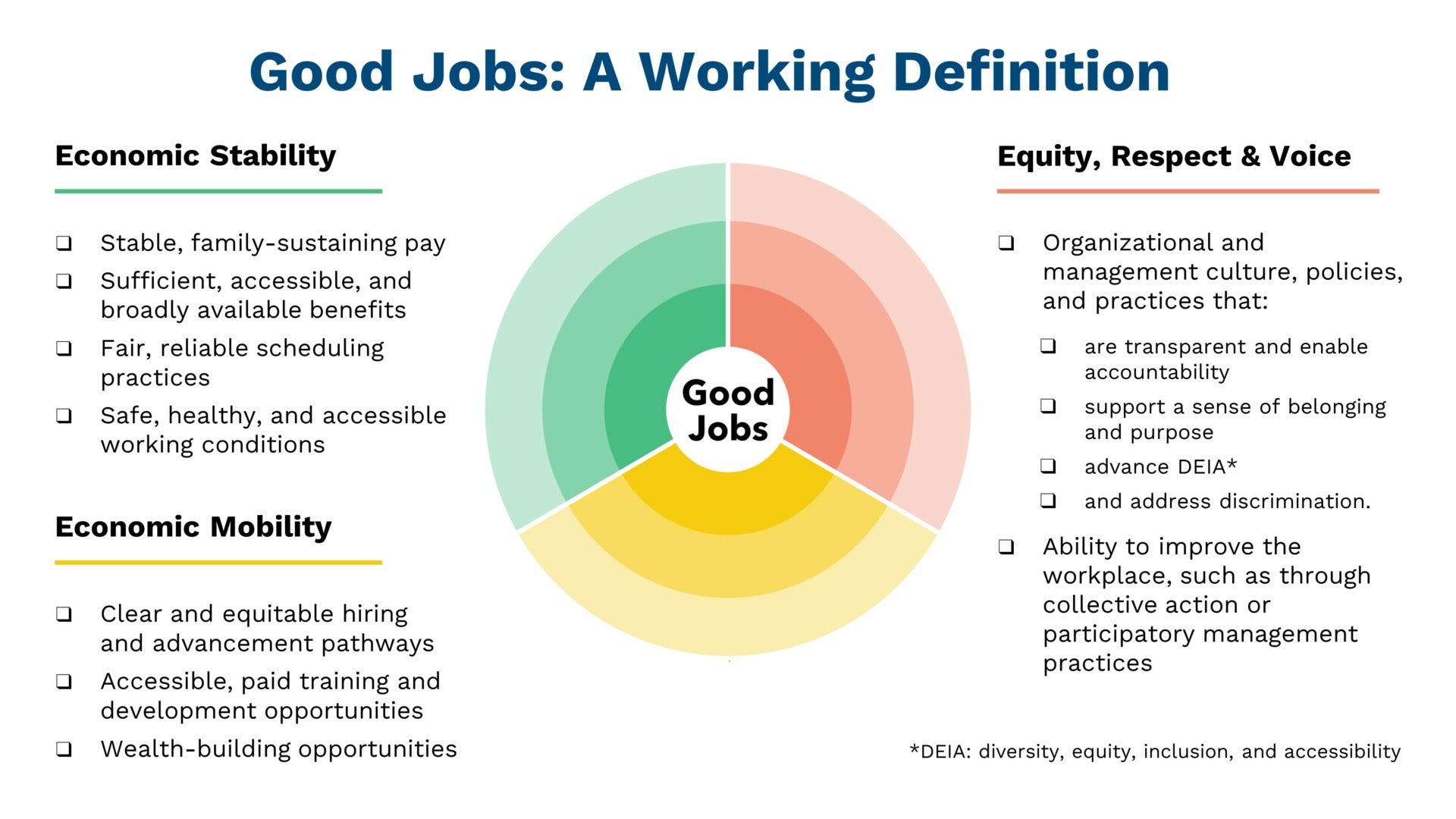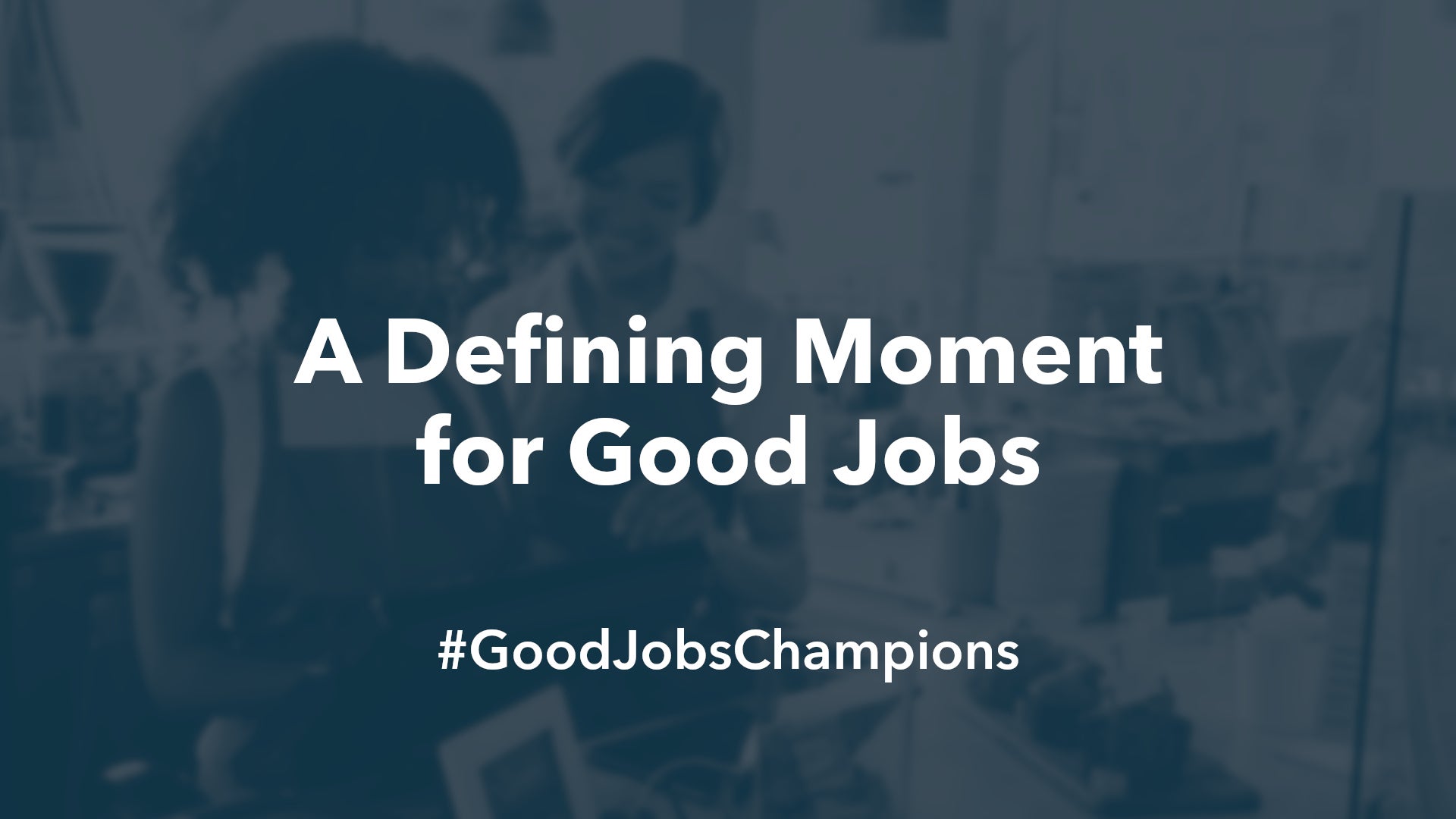Good Jobs Champions Group
Statement on Good Jobs
Para leer esta página en español, haga clic aquí.
Dozens of leaders in business, labor, workforce development, and policy have set forth an evidence-based, shared definition of job quality as part of the Good Jobs Champions Group, an initiative of the Aspen Institute Economic Opportunities Program and the Families and Workers Fund.
Good jobs are essential to a healthy economy, successful businesses, strong communities, thriving families, and a well-functioning democracy. Yet only 44 percent of working people in the US report having a “good job,” defined by satisfaction with the job characteristics they care most about. More than 30 percent of the workforce — 53 million people and disproportionately women, people of color, and immigrants — struggle with low wages. Millions more lack adequate benefits, face discrimination and harassment, and cope with other daily challenges that are the consequence of low-quality jobs.
The ideals of America as the Land of Opportunity are undermined by the reality that millions of people work hard, play by the rules, but can barely get by — never mind get ahead. The work of women and people of color especially has been devalued, reflecting the racism and sexism embedded in our labor market. Workers without higher education are too often described as “low-skill” and their contributions belittled. Even workers satisfied with their pay may lack advancement opportunities or the ability to shape a positive workplace. Work of all kinds is too often dehumanized, with jobs designed for efficient processes without regard to how people are engaged in the shared work of an organization.
It does not have to stay this way. Workers, businesses, governments, labor unions, worker centers, philanthropies, and community organizations can work together to address the job quality crisis. A critical first step is a shared definition of good jobs — a north star to guide action toward good jobs and a touchstone that provides a common language to discuss priorities. This statement puts forth such a definition, supported by more than 100 organizations and leaders representing business, labor, workforce development, policy, philanthropy, and research. The definition is both foundational and aspirational — these job quality indicators are foundational to all good jobs in all sectors and all stages of a career with the aspiration of creating good jobs where all or most of these indicators are high.

- Economic stability: Good jobs provide workers with confidence that they can meet their basic needs — for healthy food, a safe place to live, healthcare, and other essentials — for themselves and their families now and in the future.
- Economic mobility: Good jobs provide clear pathways into them and an equitable chance at hiring. They provide mobility over a career through opportunities to learn, to advance to new positions, to be recognized for accomplishments, to save, and to build wealth.
- Equity, respect, and voice: Good jobs respect the contributions that people bring to an organization, without regard to their gender, race, ethnicity, level of educational attainment, or other demographic characteristics. They engage workers in understanding their work and how it advances the goals of the organization. Workers in good jobs have the power to ensure that concerns about working conditions or ideas for improving workplaces will be fairly considered and acted upon.
Good jobs rest on a foundation of our existing labor laws, which have established basic standards to eliminate child labor; set minimum pay standards; regulate working hours; improve worker safety and health; prohibit discrimination based on race, ethnicity, national origin, sex, sexual orientation, gender identity, pregnancy, religious belief, age, or disability status; and recognize the right of workers to form a union and bargain collectively should they choose to do so. Respecting these laws as a shared set of rules to protect human dignity is a key component of creating good jobs and government enforcement plays a critical role in ensuring these values are protected in our economy. Good jobs provide these types of protections even if their particular industry may be excluded from these laws. We also recognize that effective managers support good jobs by looking for opportunities for direct reports to advance and develop, and helping to build equitable, respectful, and accountable teams and cultures.
We see this shared definition of good jobs as an essential first step in a renewed movement toward good jobs for all. We recognize that jobs are not easily separated into “good jobs” and “bad jobs,” and we use the term “job quality” to describe the actionable continuum of moving from low quality to higher quality. The undersigned recognize the urgency and potential of this moment and are committed to working toward this vision for good jobs through our daily work. We invite you to join us.
Please sign on to this shared definition of job quality here
Signatories
Michael Lastoria
&pizza
Leng Leng Chancey
9to5
Kristie Buckley
Access, Inc.
Eric Weaver
Accion Opportunity Fund
Siggi Busha’
AETC Aviation Management Group
Gina Schaefer
A Few Cool Hardware Stores
Kristina Valdez, MSW
Along The Way
Sean Daniel Murphy
Always win together.
Priscilla Sims Brown
Amalgamated Bank
Anna Fink
Amalgamated Charitable Foundation
Victor Burgos
AMBE-Advanced Manufacturing Bilingual Educators
Arlington Community Foundation
Anne Mosle
Ascend at the Aspen Institute; Aspen Forum on Women and Girls
Monique Miles and Steve Patrick
Aspen Forum for Community Solutions
Judy Samuelson
Aspen Institute Business & Society Program
Bonita Robertson-Hardy and Chris Estes
Aspen Institute Community Strategies Group
Maureen Conway
Aspen Institute Economic Opportunities Program
Ida Rademacher and Joanna Smith-Ramani
Aspen Institute Financial Security Program
Corby Kummer
Aspen Institute Food and Society Program
Domenika Lynch
Aspen Institute Latinos and Society Program
Jane Wales
Aspen Institute Program on Philanthropy and Social Innovation
Baltimore Workforce Funders Collaborative
AHM Bazlur Rahman
Bangladesh NGOs Network for Radio and Communication
Babak Bagheral
Beth Israel Lahey Health
Roy E. Bahat
Bloomberg Beta
Angela McCabe
Boston PIC
David Weil and Pamela Joshi
Brandeis University
Xavier de Souza Briggs, Molly Kinder, Annelies Goger, and Martha Ross
Brookings Institution
Anne Claire Broughton
Broughton Consulting, LLC
Sara Enright
BSR
Patti Castro
California State University, Sacramento
Sister Donna J. Markham OP, PhD, ABPP
Catholic Charities USA
Samra Haider
Center for Employment Opportunities (CEO)
Center for Law and Social Policy (CLASP)
Holly Kurtz
Center for the Future of Arizona
Chipotle
Miranda Millard
Cincinnati Works
Bridget Dazey
Clackamas Workforce Partnership
Jeff Vockrodt
Climate Infrastructure Pension Project
Brandon Dennison
Coalfield Development Corporation
Betsy Biemann
Coastal Enterprises, Inc.
Matthew Cohen
Cohen Strategy Group, LLC
Scott D. Cole
Collectivity
Lee Wheeler-Berliner
Colorado Workforce Development Council
Timothy Flacke
Commonwealth
Dorian Warren
Community Change and Community Change Action
James McRitchie
CorpGov.net
Jess Kutch
Coworker.org
Rebecca Lurie
CUNY School of Labor and Urban Studies
Melissa Hoover
Democracy at Work Institute
Jeff Haanen
Denver Institute for Faith & Work
Lilia Vergara
Dr. Bronner’s
Rick Wartzman
Drucker Institute
Heidi Shierholz
Economic Policy Institute
Taylor Jo Isenberg and Natalie Foster
Economic Security Project
Georgetta Davis
Eminent Life Careers, Inc.
Families and Workers Fund
Darren Walker
Ford Foundation
Mike Brady
G3
Katie J. Wells
Georgetown University
Sarah Kalloch
Good Jobs Institute
Elyse Rosenblum
Grads of Life
Sandeep Gupta
Green Trek Research and Development Private Limited
Rakeen Mabud and Michael Mitchell
Groundwork Collaborative
Milinda Ysasi
Grow
Charmian Tashjian
Harper College Adjunct Faculty Association
Daniel Schneider
Harvard Kennedy School
Bhairvee Shavdia and Tom Woelfel
HCAP Partners
Daniel Bustillo
Healthcare Career Advancement Program (H-CAP)
Della Walker, Jr.
Hire Newark / Newark Alliance
Allison Kelly
ICA
Denise Brown-Chillers
ICHANGE
Louis Hyman
ILR School, Cornell University
Roberta McCullough
Institute Capital, Inc
Nadira Narine
Interfaith Center on Corporate Responsibility
Erica Bouris
International Rescue Committee
Sarah Amico
Jack Cooper Investments
Don Howard
James Irvine Foundation
Mandy Townsend
Jewish Vocational Service Boston
Fred Goff
Jobcase, Inc.
Melissa A Sadler-Nitu
JobReady by LearningMate
Tameshia Bridges Mansfield
Jobs for the Future
Erica Smiley
Jobs With Justice
Alex Camardelle
Joint Center for Political and Economic Studies
Martin Whittaker
JUST Capital
Alan S. Levey
JVS SoCal
Ali Jaffar
Key Medium
Damien Dwin
Lafayette Square
Lori Davis
Lexington Public Library
Michelle Murray
Living Wage For US
Roxana Tynan
Los Angeles Alliance for a New Economy (LAANE)
Laurie Siegel
Lumen and FactSet
Chauncy Lennon
Lumina Foundation
Virginia Hamilton
Make Fast Studio
Bill Guest
Metrics Reporting, Inc.
Bill Rayl
Michigan Manufacturers Association
Thomas Kochan
MIT
Barbara Dyer
MIT Institute for Work & Employment Research
Paul Osterman, Erin L. Kelly, and Anna Stansbury
MIT Sloan School
Tanya Wallace Gobern
National Black Worker Center
Jessica Martinez
National Council for Occupational Safety and Health
Haeyoung Yoon
National Domestic Workers Alliance
Amanda Cage
National Fund for Workforce Solutions
Dr. Stephen J. Sills
National Institute of Minority Economic Development
Elba Aranda-Suh
National Latino Education Institute (NLEI)
National Skills Coalition
Justine Zinkin
Neighborhood Trust
Mary Alice McCarthy, PhD, and Shalin Jyotishi
New America, Center on Education and Labor
Asia Edwards
Nonprofit Finance Fund
H Jeffrey Rafn
Northeast Wisconsin Technical College
Northern Initiatives
Ohio Workforce Coalition
Omidyar Network
Byron G Auguste
Opportunity@Work
Rick Plympton
Optimax Systems, Inc
Walt Tobin
Orangeburg-Calhoun Technical College
Anna-Lisa Miller
Ownership Works
Bulbul Gupta
Pacific Community Ventures
Kamalu Shehu Garba
PCACC
Jessica Zorola
Per Scholas
Jodi M. Sturgeon
PHI
Piper Phillips Caswell
PHILLIPS Programs
Abbie Langston, PhD
PolicyLink
Jim Baker
Private Equity Stakeholder Project
Hilary Abell, Evan Edwards, and Alison Lingane
Project Equity
Rebecca Kusner
R4 Workforce
Dr. Gene Coughlin
Resilience-Building Leader Program Inc.
Saket Soni
Resilience Force
Dr. Sekou Siby, DBA, and Marie L. Wiggins
Restaurant Opportunities Centers United
Morgan Golin and Celeste Richie
Results for America
Jeffrey M. Siminoff
Robert F. Kennedy Human Rights
Peter Callstrom
San Diego Workforce Partnership
Tyra Mariani
Schultz Family Foundation
Mary Kay Henry
SEIU
Christopher W Cox
Seventh Generation Interfaith Coalition for Responsible Investment
Santiago Leon
SGL Insurance
Mangle L. Shanks, Ph.D.
Shanks Health Housing Employment Education & Training Services, Inc. (SHEETS, Inc.)
Pegge Boehm, PBVM
Sisters of the Presentation of the Blessed Virgin Mary of Aberdeen SD
Steven Lee
SkillUp Coalition
Andre Green
SkillWorks
Alison Lands
SkyHive Technology
John Arensmeyer
Small Business Majority
Tracy Palandjian
Social Finance
Lisa L. Walsh
South Valley Industrial Collaborative
Julie Buisson
SpringForward
Brett Hickey
Star Mountain Capital
Jeff Wasden
State Business Executives
Lexi Gervis and Adam Roseman
Steady
Stonewall Community Foundation
Rosye Blancas Cloud
STRATA9
William Chesnutt
Strategic Development Group LLC
Phil Weinberg
STRIVE
Sid Pailla
Sunny Day Fund
Jeffrey P. Bill, MD
Sunrise Treatment Center
Kimberly Shin
Talent Rewire
Samantha Gordon
TechEquity Collaborative
Dave DeSario
Temp Worker Justice
Bo Delp
Texas Climate Jobs Project
Tracy Gray
The 22 Fund
Karen Bornarth
The Bread Bakers Guild of America
Carole Beaty
The Centers
Erik Forman
The Drivers Cooperative
The Harry and Jeanette Weinberg Foundation
David Hammer
The ICA Group
Sara Chester
The Industrial Commons
Soraya Sánchez Fernández
The Languages of Energy
Patrick W. Gross
The Lovell Group
David Howell
The New School
Michelle Talarico
The Picnic Basket Catering Collective
Rachel Lipson
The Project on Workforce at Harvard
Jenny Calvert Rodriguez and John Booker
The Red Tab Foundation
Michael Horrigan and Brad Hershbein
The W.E. Upjohn Institute for Employment Research
Adrian Haro
The Workers Lab
Talia Nagar
Tipping Point Community
Bendu Griffin
Tonma, LLC
Ashley Shabankareh
Trombone Shorty Foundation
Constance Ricketts
Tulipshare Ltd.
Bryan Pino Goebel
Turning Basin Labs
Neidi Dominguez
Unemployed Workers United
Kelly Pope
Union Gospel Mission of Tarrant County
Emily Montan
Unitarian Universalist Fellowship of Northern Nevada
Amanda Ream
United Domestic Workers/AFSCME
Stephanie Hoopes, PhD
United For ALICE
Connie Beal
United Way’s Working Bridges
Chris Benner
University of California, Santa Cruz
Susan Lambert
University of Chicago
Arne L. Kalleberg and Nichola Lowe
University of North Carolina at Chapel Hill
Jenna Myers
University of Toronto Centre for Industrial Relations and Human Resources
Elisabeth Jacobs
Urban Institute
Jonathan Fisher
Washington Center for Equitable Growth
Jamon Alexander
West Michigan Center for Arts + Technology (WMCAT)
Cait Garozzo
West Philadelphia Skills Initiative
Tamear Henegain
Willow Foundation- Heartwood Center
La June Montgomery Tabron
W.K. Kellogg Foundation
Ellen G. Frank-Miller, PhD
Workforce & Organizational Research Center (WORC)
Jen Gresham
Work for Humanity
Emily Timm
Workers Defense Project
Erin Patricia Jones
Workforce Boulder County
Larry Schlang
Working Metrics
Amy Mazur
Work Intervention Network
Jacqueline Ashley
WorkLifeHealth.design
Cynthia Williams
WorkLife Partnership
Monica Munn
World Education Services
Lindsay Blumer
WRTP | BIG STEP
Gerald Chertavian
Year Up
Amanda Ahlstrand
Karla J Avery
Kirk Bails
Barbara Bush
Vanessa Carrington
Mary Jo Cook
Elizabeth Enright
Whitney Fields
Robert B Godwin
Sara Gomes
Vasileios Grigoriou
Dee Halzack
Mary Hughes Willis
Matt Littrell
Jerome McIntire
Sarah Miller
Maria Misovich
Ashley Putnam
Nesha Robb
Borja Rodriguez
Theresa Severson
Jessie Spellman
Grace Ukoha
Jessica Valand
Brooke Valle
Click here to see reactions from leaders who signed the statement.






